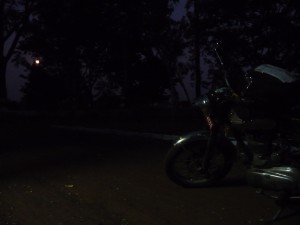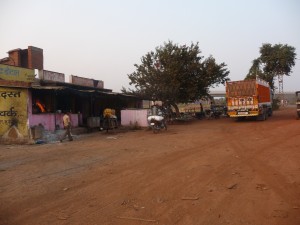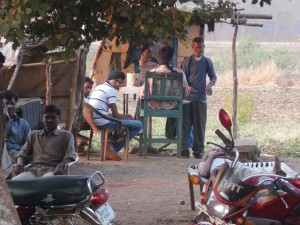Oohhh I like it here. Warm and welcoming and friendly. Mister Gautam showed me my room in the Government Resthouse – a small palace, slightly crumbling in a grandiose way. A bath room full of big black ants and their deceased kin, a western toilet, and hot water! High ceilings, a large supporting arch in the middle of the room, double bed, sofas, table, curtains, a little mosquito repellent thing that plugs into the electricity outlet (is there a name for these things?). Makes me feel like I’m in Upamanyu Chatterjee’s English, August. Also the lovely small-town feel. So at ease. Mister Gautum is a Civil Servant in the roadworks department, managing the resthouse is one of his duties. He treated me to a cup of tea when I walked by, on my way to find something to eat. We had a little chat, then I moved on to the hotel, as they call restaurants in India. (If you want to sleep, ask for a lodge or guesthouse.) Great food – but what’s with the chapati? Always waiting for you to finish your chapati, only then you get your rice. I gave up tonight – they kept bringing the little bread pancakes, so I just didn’t have the rice. I guess it’ll all be ok once I make it down south.

When I’d left in the morning large chunks of meat were scattered over the road, initially one or two every hundred metres or so. Too many to simply have fallen off a truck, or not? Went on for kilometres and kilometres, with towards the end a large amount just before the toll booths. After that it was a little less, until it stopped. Cars swerved to avoid it, but except that no one paid any attention to it, apart from the crows and the dogs.
Photographs that were not taken today include the lonely, bright purple flowers in the divider of the road, the herd of camels in the early morning, the very beautiful and incredibly bored-looking girl on the back of a motorcycle, the two trios on motorcycles, whom I later met at breakfast (paan stained smiles from six happy people), the piaggio full of bones – probably water buffalo though I imagined them to look rather like small elephants.
If a crashed vehicle faces the oncoming traffic in the places where I learnt driving, it’s usually a sign that something went very very wrong. Now, judging by the way the front end often looks, or by the fact that one example consisted of a burnt out truck and a twisted frame of a tractor, the assumption that some of these accidents are serious is a safe one. But the reason one of the cars is facing the other one, is usually because it already was – it was heading in the opposite direction. Why take a detour if the only price you pay for the shortcut is going against the flow for a while?
There’s more that I’m not used to on these highways – speed breakers, for instance. Usually unmarked – except in the puzzling case where a sign appeared after two rather mean, high bumps, causing me to drive extra carefully for another kilometre or so.
I rode for a long while, teabreaks providing welcome relief from the unforgiving saddle. At some point during the ride, on one of the many intersections that a village always is, a small green truck some distance away turned and blocked my path. I reacted appropriately, and only after that I realised I’d done that fully automatically, hardly registering doing it. I noticed having slowed down, then realised the truck was there and that its appearance was the reason for my actions. Good to know I’m that reliable, but clearly time for a break. More sweet strong milky tea, please.
Just before Kanpur, I crossed the river Ganga, its banks full of people. Ready for today’s festival? The city on the cliffs that rise up steeply out of the river, housing (busy, people ready for the festival?), Kanpur on the other side. The banks rose up steeply, vertically, housing lots of swallows. I rode through some suburbs and lots more country, later on crossing the Yamuna river. I came – around Orai, if I read my map correctly, by a beautiful big palace in the style I always think of as Moorish. Similar to some of the things in Hampi. Would be nice to know more about India’s history and be able to understand why that building looks like it does.
Around Jhansi, the land became hillier. Then an irrigated area started, much greener. Back to Savannah, reminds me of pictures I’ve seen of Africa. The ones with the giraffes. For a while, there were a lot more cows on the road. Then, after riding around a lake that didn’t show on the map and featured boats as well as submerged buildings and trees (a seasonal lake? overflowed river?), I rode up into the hills. On the other side, a maroon bullet and its handsome rider came down, enthousiastically honking. For a few kilometres, cutting through the hills, there were no cows. Only large, fierce-looking dogs and a few monkeys with halos of white hair. Up on the plateau, the cows were back. The land moved between savannah and cultivated plots separated with small walls.
When I ran out of petrol, a man stopped on the other side of the road. It turned out the few buildings I’d seen about a kilometer back, were a village with a man in a garage who had a large drum of petrol. He sold me one in a plasic bottle with no top, and my saviour took me back to my bike, which we’d left in the care of someone who was with him. He wouldn’t accept anything for his services, and after we said goodbye I was on my way again. Riding into the beautiful national park, just road and dark green trees and hills. Still savannah. Here and there ruins of buildings – what happened there? Evicted when the area was turned into a nature reserve, or simply abandoned? No sign of population anywhere. The air felt pleasantly cool at the end of the afternoon and with the riding wind, while the sky was becoming a slightly deeper shade of pale blue.


After filling up at the petrol station a few kilometres onwards, the signs still told me I was on or on my way to the NH 76, the road to Kota. Very quiet, lots of cows going home. And why not? There’s more traffic of cows and goats and farmers than motorised vehicles here, so it’s only logical they use the easiest road, in fact simply the there is. Two kids, against the traffic direction, very relaxed, chatting on their bicycles. No problem, just swerve around them. All so calm… water buffalo cows goats, dogs – strays or employed?
Kishanganj had seemed nice conclusion of today’s ride – on the banks of the river Parvati, the third holy river of the day (they’re all holy, aren’t they). However, when the sun touched the hills on my left, I stopped to exchange my sunglasses for clear ones. When I looked up again, the sun had disappeared. Kishanganj another 75 kilometres away, and though the road was in excellent condition, I didn’t want to risk not seeing cows, boulders, things fallen from trucks, or unlit slow moving vehicles. Skipped the turn-off to Dewri as I’d decided for Shahbad because it sounded nice. And indeed, I couldn’t have wished for a better place to finish the day. Some villagers argued about which lodge to send me to, but a tall smiling man dismissed all the other ideas and decidedly showed me the way to the Government Resthouse. Of course I don’t know what the other one(s) were like, but I’m happy here. I’ll save Parvati for breakfast.
